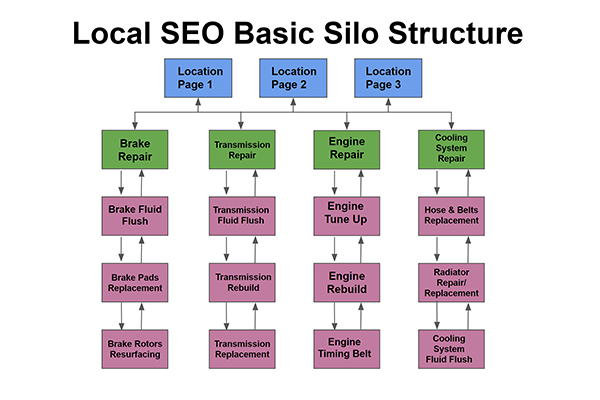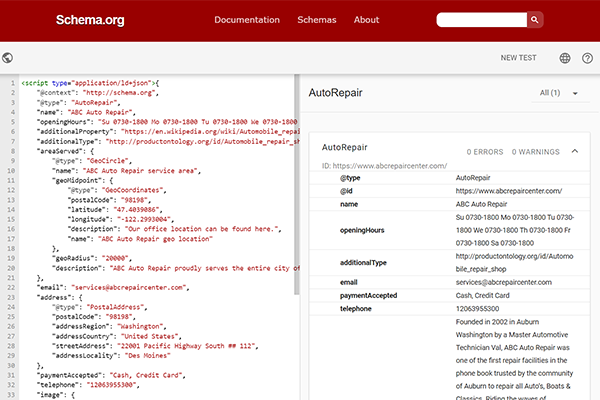
The factors determining your website’s Domain Authority (DA) are pretty simple and make a lot of sense. However, Moz.com’s implementing them into an algorithm that accurately mimics Google’s Pagerank measurement is pretty sophisticated.
Domain Authority is calculated using more than 40 factors. These include the relevance and quality of your content, internal interlinking, social signals, structured data, and, most importantly, the pages and root domains linking to your website. The quantity of backlinks matters only to the degree they are relevant and authoritative. Moz also uses a machine learning algorithm that looks at how these factors affect how real websites appear in Google searches.
This article will discuss the main factors you should focus on in improving your DA score. I also recommend you read my articles: “How To Increase Domain Authority With Backlinks In Local SEO!” and “What Factors Determine Domain Authority?“
The below video is one I did to go along with this article. In it, I briefly explain the things I write about in this article. I recommend you watch it to add to what I have in this article!
Relevance & Quality Of Content

The cardinal rules many people mess up on are “Write Quality Text!” and “Stay On Target!” What do I mean by that? Let’s talk about both of these areas briefly.
Write Quality Text!
Write something people will want to read. Make it interesting and engaging. And for heaven’s sake, have a human being write original text. Don’t use AI or spun text.
Also, use good grammar and spelling. Once you finish writing the page, go back through it a few times to edit it and ensure it reads well. If people don’t read your content, the search engines will know this, and this will affect your DA score.
Not only are search engines smart enough now to know what your sentences are saying, but they also know if you spell things wrong and if your grammar is poor. And they know if readers read your content or bounce right off the page. Take the time to write well-written, enjoyable-to-read content.
Stay On Target!
It amazes me how often I read content where the paragraphs on the page are not really what the title of the page or the subtitle it is under says it will be about. People have writers A.D.D. I guess and wander off of topic. Please don’t do this.
I recommend that you take the time to read my article “How To Optimize Content For Local SEO!” Your page titles, title tags, and subtitles need to be planned out before you write each page and, in an organized fashion, target the keywords and related keywords you want to rank for.
All of your subtitles on a page need to be perfectly within the topic of the title and title tags of the page they are on. And all of the paragraphs beneath a title or subtitle need to fit perfectly within the topic of that subtitle. Your paragraphs need to be about what the subtitles say it will be about. This sounds like common sense, but it is a very common mistake.
And you very specific language. I find that the more specific writers try to write, the more they naturally fit industry and location-relevant keywords into the text. This is important. It needs to fit into the text in a natural way, not just awkwardly placed into the text. It needs to read naturally. And writing, more specifically, seems to get this done nicely.
Silo Or Related Topic Interlinking

If you interlink the content on your website properly, it passes authority between the pages and builds the DA score of each page, including the home page.
In fact, it can reduce the amount of external links you need to achieve the same DA score. Let me say that again! It can reduce the number of external links needed to achieve the same DA score! That is huge!
To learn how to do this properly, I am going to recommend that you read my article “How To Boost Local Rankings Through Silo Structure Interlinking!” The basic idea in siloing for local SEO is to interlink all of your related content together in groups (that look like grain silos), as shown in the above image.
Posts and pages are mini websites and, if done properly, have authority in themselves that can be passed along to increase the authority of the pages they link to. In local SEO, you can structure this in a way that your location pages or home page show up in the SERPs for every keyword targeted on the entire website. This significantly increases the DA score of your site.
Quality Relevant Social Signals

By quality, I mean the types of social signals that help your content the most. These are things like other people sharing pages of your website on their social media, as well as when you share it, people commenting on, sharing, and liking your posts.
Relevant would be people from your industry as well as from your city doing these quality types of social signaling or interacting. Customers are the very best source of these social signals. They used your product or service and are in the same town.
The best way to proactively promote these social signals is by encouraging really happy customers to write a Google review for you and to share your Google Business Profile or a page from your website on their social media. I find that giving them a coupon for future service or a discount on their current service is the best type of incentive to make sure they actually do this.
And since most people have smartphones now, it is easy just to ask them and help them do it right when you give them the discount or coupon while they are in your office or with you on the phone.
Structured Data

The reason Schema Markup or structured data helps build your DA score is because it focuses search engines on who your business is, the industry and town you are in, as well as many of your related properties such as your Google Business Profile, YouTube channel, and other business directory and social media profile pages that link back to your website.
The search engines being directed to your business directory and social media sites keep them indexed in the search engines so that the search engines remember all of their links to your site. That is why it is important to include as many of these types of authoritative profiles as you can in your structured data.
To learn how to do your local business website structured data properly, I recommend reading my article “How To Do Schema Markup For Local SEO.”
Relevant Authoritative Backlinks

If you have been reading the articles on this website for very long, you have seen me say that assuming you do everything else correctly, there is nothing that will have such a powerful effect on increasing your DA score and, therefore, your rankings, then building quality relevant backlinks to your website.
Search engines like Google view backlinks, especially contextual backlinks, as the linking website vouching for and recommending the content of the page it is linking to. If the linking page and site are relevant to your industry or city, it passes a lot of authority to your website. And if the linking website has a higher DA score than your website, it passes even more.
To learn how to build the best backlinks to build your DA score, I recommend you read my article “How To Increase Domain Authority With Backlinks In Local SEO!” The more competitive your industry or market is, the better job you want to do at building your website’s DA score.
Final Thoughts
This article is one of the most important articles that I have written thus far on this website. I can’t emphasize enough how important it is to read, understand, and implement the tactics taught in this article and the articles I link to.
Please carefully read this article and the articles I link to from this article and implement this all on your local business site, and you will see your rankings improve.
